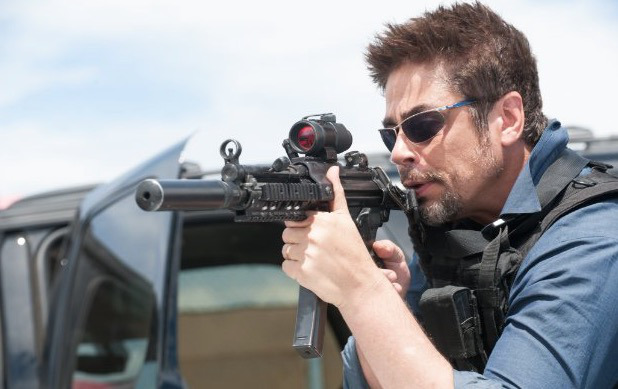In the parlance of the unwinnable war raging along the bloody borderlands of the U.S. and Mexico, “sicario” means “hitman,” a profession in high demand among the nihilistic drug cartels and — in a sure sign of a battle with no moral victor — the government operatives tasked with fighting them in this grim thriller.
Director Denis Villeneuve (Enemy, Prisoners) wastes no time introducing us to the horrific violence wrought by these paid killers. In Sicario’s opening scene, FBI agent Kate Macer (a spellbinding Emily Blunt, acting as the idealistic audience surrogate) participates in a raid on a house in suburban Phoenix. The SWAT team doesn’t find the hostages it was looking for, but within the walls of the prefab structure, rotting bodies are stacked. Kate’s nauseous gut reaction to the macabre discovery marks her as someone who hasn’t yet been hollowed out by the realities of a drug war battleground like Juarez, where we will later see naked corpses dangling from an overpass during a nerve-wracking action sequence.
Kate is recruited by an unflappable, sandal-wearing spook named Matt Graver (Josh Brolin, macho and magnificent) to join an inter-agency task force working to remove the head of the cartel that put those bodies in the house in Arizona. Much of the team’s motives and goals remain shrouded early on. That mystery is embodied by Alejandro (a haunted Benicio del Toro, who deserves an Oscar for the the sheer threat of his body language alone), a former Mexican prosecutor who appears to have more of a personal stake in the mission than he initially allows. Screenwriter Taylor Sheridan (Sons of Anarcy) never gives us more than he has to, but Alejandro’s character, and the task force’s real objective, become all too clear as the film winds back and forth across the border.
Cinematographer Roger Deakins renders the desolation of the Southwest desert and the chaotic jumble of a Mexican border town beautifully through striking aerial shots, while the violence on the ground is given a gritty, documentary-like feel. Sicario is a visceral and physical experience, to the extent that it feels necessary to use phrases like “gut-wrenching” and “white-knuckle” to describe its unrelenting pace. It is, in equal turns, repulsive and utterly compelling.
A number of taut set pieces ratchet up the film’s already considerable tension, with a tunnel assault shown in part through green-and-black night vision calling to mind the methodical storming of Osama bin Laden’s compound in Zero Dark Thirty. (Another unfortunate parallel to that film is Sicario’s implication that torture produces valuable information for government-sanctioned agents with a cavalier approach to enhanced interrogation techniques). Sicario, too, is concerned with the moral depths the “good guys” sink to in order to combat an enemy that recognizes no rules of engagement, and treats violence and terror against innocents as the cost of doing business.
There are no laws in a “land of wolves,” as Alejandro puts it. In Sicario, one of the year’s best films, there are no winners, either.





